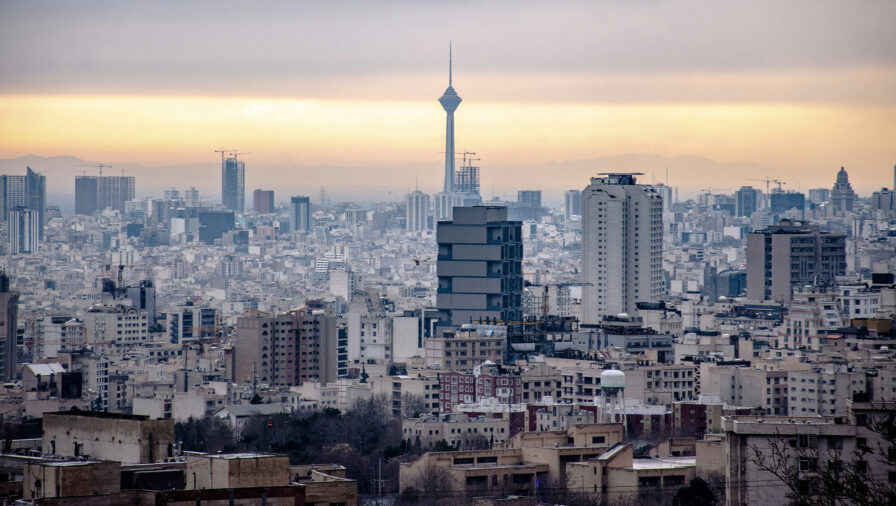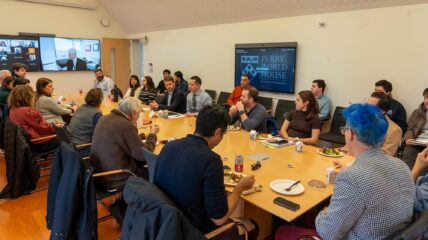Israel’s Strikes Against Iran: A Q&A With Hussein Banai and Marie Harf

In the early-morning hours of Friday, June 13, Israel launched a series of strikes against Iran with the stated aim of taking out their nuclear program (which Israel claims has progressed far more than was publicly known). Perry World House Visiting Fellow Hussein Banai, an associate professor of international studies at Indiana University’s Hamilton Lugar School of Global and International Studies and an expert on U.S.-Iran relations, and Perry World House Executive Director Marie Harf, a former CIA analyst on Middle Eastern leadership issues and senior advisor for strategic communications to then-Secretary of State John Kerry during the JCPOA negotiations, shared their expertise and analysis of the current situation in a Perry World House Q&A.
What prompted Israel to strike Iran now?
Marie Harf: Prime Minister Netanyahu has long wanted to strike Iran, having never believed in a diplomatic process to resolve the nuclear issue. Israel clearly feels emboldened by its military successes over the past few years against Hezbollah and Hamas leadership – including the killing of Ismail Haniyeh in Tehran, demonstrating they could penetrate deep within Iran. There are also indications Netanyahu was nervous Trump (who told Netanyahu not to attack now) was about to make a deal with the Iranians that the Israeli leader viewed as a bad one. While it is true that Iran’s nuclear program had advanced significantly since Trump tore up the previous JCPOA nuclear deal in 2018, there is no publicly available evidence that Tehran was rushing for a bomb at this time. The Israelis had clearly spent a lot of time smuggling weapons into Iran and setting the stage for this attack, and Netanyahu finally decided he wasn’t going to wait around to see what these U.S.-Iran diplomatic negotiations might result in.
Huss Banai: The timing of the strikes—in the midst of bilateral nuclear talks between Iran and the United States—suggests the Israeli government has concluded that any diplomatic outcome will not be in its national interests. Leaving aside the salience of that assessment, it is clear that Prime Minister Benjamin Netanyahu’s faith in President Trump—who he all but actively campaigned for in the last election, solely for his position on Iran – and his administration’s ability to deliver a favorable outcome has waned. A nuclear deal with Iran under only marginally more restrictive terms, but with Trump’s stamp of approval, would have been the worst possible outcome for Netanyahu—far worse than the 2015 JCPOA agreement between Iran and the P5+1. As such, the impetus behind attacks seems to be more strategic (i.e. to end the talks by changing the bargaining board altogether) than preemptive (as Israeli officials have claimed).
What did Israel strike? Why do you think they chose these targets?
MH: It’s clear this was an operation against a much broader set of targets than Iran’s nuclear program, to include very senior military leaders, several of whom were killed. It remains to be seen how much damage Israel was actually able to inflict on the nuclear program itself, namely, whether they were able to cripple Fordow, Iran’s underground nuclear facility. Without essentially destroying Fordow, the setback to Iran’s program will very likely be temporary and limited. Even so, the Israelis chose both the level and breadth of targets to indicate they can reach essentially anywhere they want into Iran, to demonstrate both military and intelligence agency superiority.
It’s clear this was an operation against a much broader set of targets than Iran’s nuclear program, to include very senior military leaders.
HB: The targets range from top nuclear and military officials to enrichment facilities to missile launch sites and air defense stations. The wide range of, and the precision directed at, the targets clearly carries a blunt message from Israel: that on its own and without any help from the United States, the Israeli military and intelligence have the capacity to overwhelm not just Iranian defense and intelligence apparatus but also decapitate its political leadership. The asymmetry between Israel’s military-intelligence prowess and that of Iran’s is especially revealing because it shows how Israel’s leverage goes beyond deterrence capabilities and could extend to plans for regime change in Tehran.
What do you think Iran’s response will be?
MH: The Iranian regime’s ability to respond has been severely weakened by sustained Israeli actions against it and its proxies over many months now, in addition to the fact that several of the leaders who would be involved in planning a counterattack were killed in this operation. The initial public response from Hezbollah, for example, has been more muted than some might expect, possibly because of the real damage Israel has done to the group. Netanyahu is clearly expecting Iran to try to strike Israel and seems to be counting on both the United States and other regional actors such as Jordan to help defend Israel from Iranian missiles. It remains to be seen whether Iran will retaliate against American assets in the region, a fear that resulted in the Trump administration making it publicly very clear that it was not involved in the Israeli operation.
HB: The immediate Iranian response can only be limited given the impact of Israel’s attacks on Iran’s missile capabilities and air defenses. Any large-scale attack by Iran could easily be met by an even more robust retaliatory air campaign or missile strikes by Israel. So the Iranian leaders face a serious dilemma: how to respond in a manner that does not invite overwhelming counterattack, but that also signals resolve and strength to its supporters at home and across the region. It is a tough balancing act that I’m not sure the regime, given the scale of Israeli attacks, can manage in a convincing manner.
Iranian leaders face a serious dilemma: how to respond in a manner that does not invite overwhelming counterattack, but that also signals resolve and strength to its supporters at home and across the region.
What type of response—if any—do you think we may see from the Arab countries?
MH: The Arab countries (and there is variance among them), while certainly no fans of Iran, are likely concerned about a potential wider regional conflict that they might be pulled into as a result of this Israeli operation. The Saudi Government—which, in the not-too-distant past, was very close to signing a normalization agreement with Israel—has already condemned the attacks and called on the UN Security Council to “act swiftly the stop this aggression.” Other countries such as Iraq and Jordan very well may have to play a role (again) in intercepting Iranian missiles fired at Israel. And Qatar and Bahrain both host very large American military facilities, prime targets if Iran would choose to strike U.S. assets. Despite all of these complications, however, it is safe to assume that, privately, maybe some of these Arab states are not unhappy to see Iran weakened even further.
HB: Ritualistic condemnation of Israeli aggression will be the initial reaction. But if this conflict spreads to internecine warfare in the Persian Gulf and starts to impact not only shipments of oil but also regional stability, then I would expect states like Saudi Arabia and UAE to take concrete steps towards isolating Iran. I do not foresee any material assistance by the Arab states to either party.
Donald Trump has reiterated that the United States was not part of these strikes and would not be part of the strikes moving forward. What do you make of this announcement, particularly given the close relationship between Trump and Netanyahu in Israel? And how do you expect Israel’s strike on Iran to affect current U.S.-Iran nuclear talks?
MH: The relationship between Trump and Netanyahu is not as close as one might expect. It is notable that, on Trump’s first overseas trip of his second term, he visited several Gulf Arab states but skipped Israel. That slight was not lost on the Israelis, to be sure. And Trump had explicitly told Netanyahu not to strike Iran now, in the midst of the U.S.-Iran negotiations—but the Israelis did anyway. Netanyahu has seemed to believe for some time that he has a stranglehold on the American political system, especially the right, and that nothing he does or says—no matter how destructive—will change that. It remains to be seen if that calculation is, in fact, correct.
When it comes to the current U.S.-Iran negotiations, we need to see first what in the nuclear program was actually destroyed in this operation. There may be nothing left to negotiate over. But, if what I suspect is correct—that Fordow was not eliminated and other locations (mines, mills, research facilities) remain intact—diplomacy remains the best and most durable path to prevent Iran from getting a weapon. Two outcomes seem most likely: either Tehran will feel so weakened by these strikes that it comes to the negotiating table ready to deal OR it will be so embarrassed and angry that it takes its program further underground and truly begins rushing for a bomb as a deterrent to prevent future strikes. Which path it will take remains to be seen.
Netanyahu has seemed to believe for some time that he has a stranglehold on the American political system, especially the right, and that nothing he does or says—no matter how destructive—will change that. It remains to be seen if that calculation is, in fact, correct.
HB: The repeated announcements of American non-involvement are instructive in what they reveal about the fundamental incoherence of U.S. policy. Given the closeness of U.S.-Israeli foreign and military relations, it strains reason that all-out war would not involve U.S. assistance to Israel at some point or level. The Trump administration is underlining its non-involvement at this phase perhaps to signal its readiness for a deal that could still preserve some of Iran’s defensive capabilities. But as Iranian officials have already indicated, any talks with an American administration that wouldn’t be able to restrain Israel is a nonstarter. What is more, as the Supreme Leader Ali Khamenei has already broadcast, Iran views the U.S. position as a cynical ploy to force Tehran to given up its nuclear program as a first step towards regime change. For these reasons, and given the fact that Israel’s attacks have substantially changed the Iran’s bargaining power, I do not foresee any meaningful diplomatic breakthroughs between Iran and the United States anytime in the short- to medium-term future.


